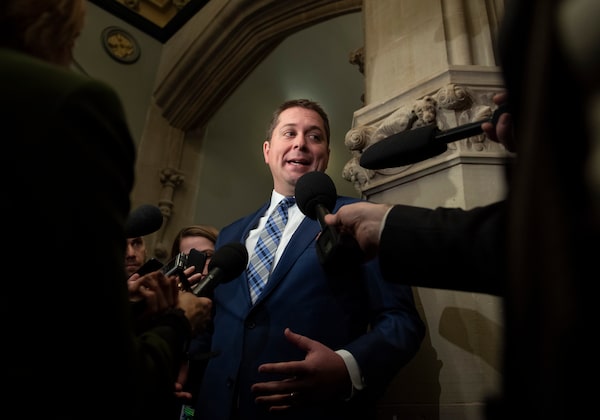
Conservative Leader Andrew Scheer speaks to reporters in a hallway after leaving a meeting with Prime Minister Justin Trudeau in his office on Parliament Hill in Ottawa on Nov. 12, 2019.Justin Tang/The Canadian Press
A century ago, a Liberal MP from Quebec rose in the House of Commons to deliver a speech for the ages. The monologue would earn Jean-Joseph Denis a place in Canadian history, although mostly for being on the wrong side of it. After all, he opposed women’s suffrage.
“I say that the Holy Scripture, theology, ancient philosophy, Christian philosophy, history, anatomy, physiology, political economy and feminine psychology all seem to indicate that the place of women in this world is not amid the strife of the political arena, but in her home,” Denis told the House in 1918, as it debated Conservative prime minister Robert Borden’s bill to permanently extend voting rights to all women over the age of 21.
Flash forward to 2005. This time, it was Liberal prime minister Paul Martin’s government that sought to tear down another barrier to equality with Bill C-38, defining marriage as “the lawful union of two persons to the exclusion of all others.” And a neophyte Tory MP from Saskatchewan took to the floor of the House to declare he would have none of it.
“There is nothing more important to society than the raising of children, for its very survival requires it. Homosexual unions are by nature contradictory to this. There is no complementarity of the sexes,” Andrew Scheer insisted. “Two members of the same sex ... cannot commit to the natural procreation of children. They cannot therefore be married.”
For all we know, Mr. Scheer still believes this. After all, he has had every opportunity since becoming Conservative Leader in 2017 to disavow this point of view. Every opportunity to demonstrate that he has evolved not just as politician, but as a human being. That he recognizes that what he said in 2005 was not only ignorant but extremely offensive.
At every turn, Mr. Scheer has refused to seize the opportunity.
This, along with Mr. Scheer’s inability to stand up for a woman’s right to choose, was a deal-breaker for many Canadians who voted in last month’s federal election. As with women’s suffrage a century ago, there is no going back to a time when it was alright for a prime minister to merely tolerate gay marriage and abortion. He or she must defend those and all other fundamental rights with every fibre of his or her being. Mr. Scheer has yet to show that he is up to it.
So, no, contrary to former Tory MP Brad Trost’s assertion that social conservatives such as him are “being made the whipping boy for [Mr. Scheer’s] communications blunders,” the Conservative Party did not lose the election because its leader did not articulate his anti-abortion views strongly enough. It lost because for many voters, particularly Quebeckers, Mr. Scheer’s vow not to re-open the issues of gay marriage or abortion if he became prime minister was too lame by half. It sounded like he was making a begrudging concession to modernity.
Every Canadian is guaranteed the freedom of conscience to personally oppose abortion or gay marriage. But the idea that anyone would seek to deprive all Canadian women of the right to control their own bodies or prevent two loving adults of the same sex from marrying just to satisfy their personal moral code is abhorrent. Mr. Scheer’s inability to articulate that basic distinction is what cost Conservatives the election. If he stays, it will cost them the next one.
Anti-abortion groups seek only to drag Canadians into an ugly culture war that they cannot win. The sooner the Conservative Party makes it clear that it wants nothing to do with them, the better off it and the country will be. The party platform needs to include a full-throated endorsement of a woman’s right to choose and gay marriage. There can be no more wink-wink pandering to social-conservative extremists by suggesting that Conservative MPs would be free to table a private member’s bill limiting access to or banning abortion, or one permitting health-care professionals to refuse to provide abortion referrals.
Canada needs a viable and vibrant centre-right alternative to the centre-left Liberals. The inherent tension between these two forces, each prodded by civil society and third parties on the outside, makes our democracy stronger and leads to better government.
Under Mr. Scheer, the Conservative Party is anything but vibrant. It may have held onto its base in Western and rural Canada, in parts of the country where Prime Minister Justin Trudeau is particularly disliked, but it is stuck in a time warp. It needs to enter the 21st century.
It may be too late for Mr. Scheer to be remembered by history for anything but his 2005 speech. But it’s not too late for him to go out on a high note by admitting he was wrong.